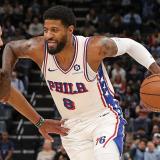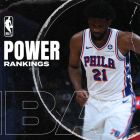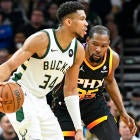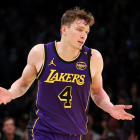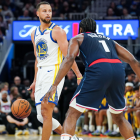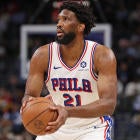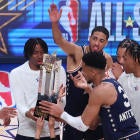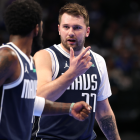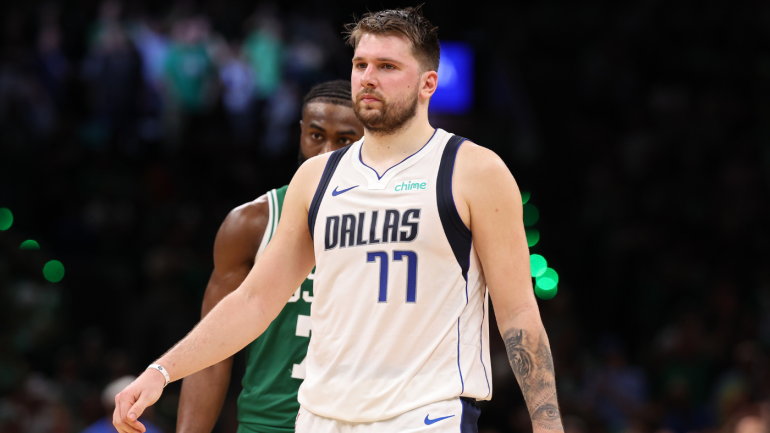
Both of the following statements about the Dallas Mavericks can be true:
- They are, in a vacuum, an ascending team. Their core seven-man rotation in the playoffs featured only one player (Kyrie Irving) over the age of 27. Luka Doncic is still only 25. Dereck Lively II, who looks like a future All-Star at center, just finished his rookie season. There is untapped young talent still in the pipeline in Jaden Hardy and Olivier-Maxence Prosper. Their starting lineup, which went 27-6 before the Finals, was assembled at the trade deadline and should only improve with continuity. In all likelihood, this version of the Dallas Mavericks has not played its best basketball yet.
- Given the depth of of the brutal Western Conference, the abundance of injuries that tend to strike NBA teams during the playoffs and the seemingly random nature of which teams bear the brunt of them, the inherent randomness of a sport in which a small ball is thrown long distances through a small net and the fact that they were playing a Boston Celtics team with a hobbled Kristaps Porzingis, it is very possible that the Mavericks will never have a better chance at winning the NBA championship than they did this season.
These are the somewhat inherently contradictory ideas that govern modern championship pursuits. It seemed like a certainty that the Denver Nuggets would make it back to the NBA Finals this season after winning it all last June, didn't it? We all saw how that played out. The Mavericks will probably be better next season. So will a handful of other Western Conference contenders. Maybe the injury bug that bit the Clippers and Pelicans this spring goes after the Mavericks next April. Every year is different. Every year is seemingly harder than the last. It twists the knife of defeat deeper into the bodies of those that come closest. The Mavericks could be better next year than they are now and lose in the second round because of a poorly timed ankle sprain or some bad shooting variance. You can't depend on circumstances breaking your way every year. When these chances present themselves, you have to grab them.
So why couldn't Dallas? There were factors the Mavericks couldn't control, of course. A healthier Doncic would have helped a great deal. Running into a 64-win Boston juggernaut didn't help either, but it's not as though you can expect to avoid dominant opponents in the Finals. But as far as contenders go, the Mavericks remained a relatively flawed one all the way into the Finals despite their success. The perimeter shooting out of their role players was a bit overblown all along. P.J. Washington and Derrick Jones Jr. varianced their way around that weakness in the second round when they shot 42.3% on the wide-open 3's doubling Doncic created. That same duo shot 34.4% on wide-open regular-season 3s. And then, they won the Western Conference's game of matchup rock-paper-scissors in the next round. The Timberwolves were built to neutralize the Nuggets with their massive front-line. They had no perimeter defenders strong enough to handle Doncic one-on-one.
But Boston? The Celtics were comfortable with any number of defenders taking on Doncic solo, even their two best players. Jaylen Brown took the primary Doncic matchup. Jayson Tatum mostly guarded the Dallas centers in what was effectively a pre-switch. If Doncic wanted to run pick-and-roll with his big men, he'd be drawing another stellar defender instead of the sort of immobile big men he's used to in such situations. Boston's ability to contain Doncic one-on-one broke the rest of the Dallas defense. The Mavericks fell from around 16 corner 3-point attempts per game against the Thunder to roughly five in the Finals. Their lobs were gone. If the role players were going to score, it was going to come on the sort of harder, above-the-break and self-created shots the Celtics didn't think they were capable of making. They were right.
The defense, so dominant since that trade deadline shakeup, finally started to show cracks. A group designed to take advantage of its size by throwing help-defenders all around the court was stymied by Boston's five-out offense. In one-on-one situations, they could stay in front of the Celtics. The Celtics don't run a rim-heavy offense, but the shots they got there were easy. They were easiest when Doncic was involved. Whether it was a function of his health, foul trouble or a more persistent issue, his defense was bad in this series. It has to be better if Dallas is ever seriously going to challenge an opponent at Boston's level.
These issues are fixable, but tricky. How much of the core identity the Mavericks have spent the past four months building are they willing to sacrifice in the name of improvement? There's currently an $18 million salary slot on this roster going to a theoretical third shot-creator, for instance. That's Tim Hardaway Jr. He was great through the end of January, fell off a cliff from there and was a playoff no-show. Dallas could mitigate a lot of their secondary scoring woes by either getting Hardaway back on track or using that slot on someone who will produce at a level commensurate with that salary. But aside from the salary commitment, is it even possible to get a third scorer going in on offense that already devotes so many possessions to Doncic and Irving? Dallas probably wants to answer this question with Jaden Hardy -- earning only $2 million next season -- rather than an expensive veteran like Hardaway.
The defensive questions are a bit trickier. Say you go out and find a point-of-attack defender. Where does he slot into the lineup? Derrick Jones Jr. hasn't been the issue on that front, though the Boston matchup is less than ideal for him. Yet Doncic, Irving and a center are staples. Take out Washington and the offense starts to get iffy unless the defender you find can also shoot and dribble. High-level defenders that shoot and dribble aren't exactly common.
Jones is set to be a free agent this offseason, and thanks to his Non-Bird rights, the Mavericks probably have to plan to stay below the first apron -- a projected $179 million -- so they can sign for the non-taxpayer mid-level exception this offseason. With roughly $173 million already committed, that's going to mean shedding a bit of salary. Hardaway is an obvious candidate.
The Mavericks still have two tradable first-round picks to work with this offseason in 2025 and 2031. They'll probably want to use those picks to maximize this current window. Between such a trade and keeping Jones, Hardaway is a near certain sacrifice with Hardy coming up to replace him, and then Josh Green and Maxi Kleber, both earning in the low-eight figures as bench players, become movable salaries for the sake of upgrading elsewhere. Are there sensible fits?
If they want another 3-and-D type, you'd have to figure there would be interest in a reunion with Dorian Finney-Smith, a close friend of Doncic's from their first run together. The Nets are going nowhere and likely wouldn't mind adding even more draft capital. Alex Caruso is appealing for the same reasons, though he'd likely come at a higher pick cost. Neither would figure to cost the Mavericks more than one meaningful contract. They are both relatively cheap for their skill sets. Bruce Brown is a bit more expensive but comes with some ball-handling juice.
If it's offense, things get trickier. Dallas doesn't have the capital to shop at the top of the market (though by all means, call and ask for Jimmy Butler, he'd help on several fronts if Dallas is one of the teams that is reportedly willing to extend him). They probably wouldn't even have the salaries to match on Zach LaVine even if he wouldn't compromise their defense and was healthy. Maybe Jerami Grant is a middle-ground here? Does he clash too much stylistically with Washington? Could Bogdan Bogdanovic hold up defensively? Could Malcolm Brogdon stay healthy?
There isn't an obvious move on the board. There wasn't at the trade deadline either. The Mavericks took big swings at the deadline on players they believed in more than the market (and me!). Washington and Daniel Gafford arrived in Dallas and immediately played some of the best basketball of their careers. Another version of those moves is probably what we're looking at here. If the Mavericks go shopping, it will be for a player they think can similarly improve under their guidance.
They've struck gold on players like that before. They're going to have to aggressively seek out more of them now. Denver was proof that nothing is certain in this conference. Complacency will get Dallas nowhere. No version of this team was good enough to beat Boston. The Celtics aren't going anywhere, and the rest of the West will be gunning for Dallas next season. Internal improvement is probably coming, but if the Mavericks want to overcome the relatively low odds of anyone repeating in this conference, they're going to have to find help from the outside.




